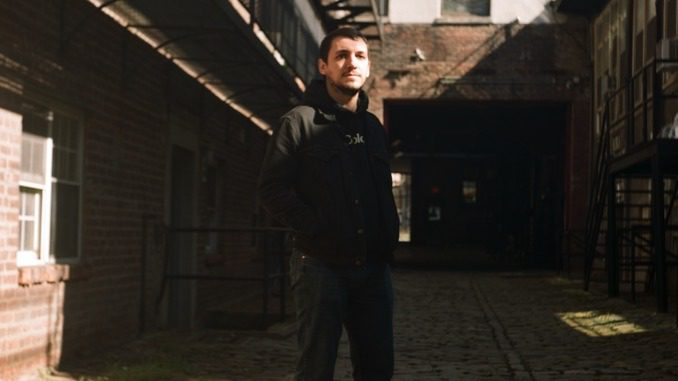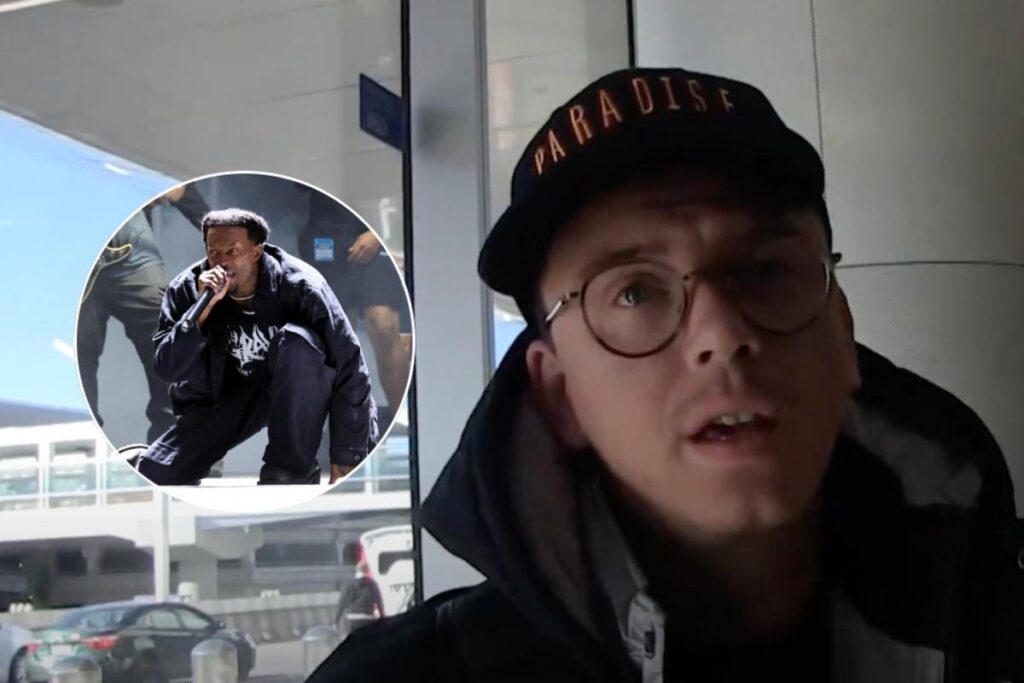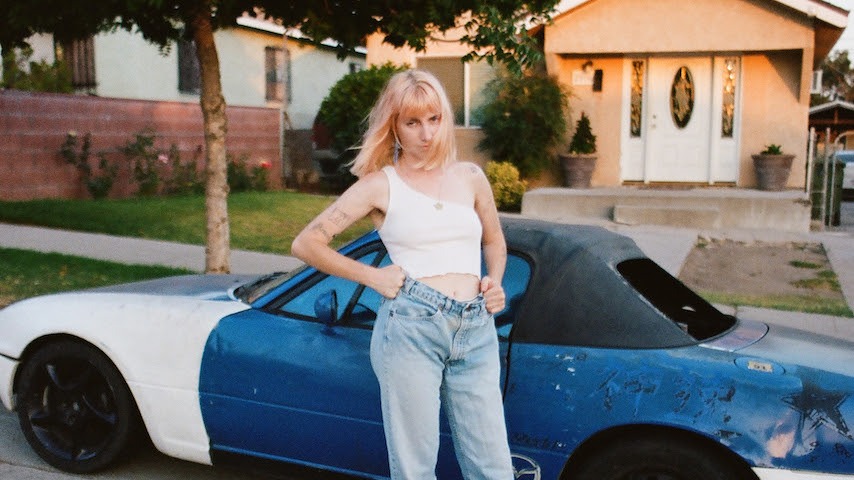There is a moment towards the end of “I Saw The Wheel,” the leadoff track from Heaven’s Just a Cloud, the debut album by Spirit Was, where mastermind Nick Corbo lets you know with bone-white intensity that he didn’t come here to fuck around. After the first three minutes of droney, drop-tuned guitars and pleading lyrics from the ex-LVL UP songwriter, the song builds to an all-out black-metal assault, with Corbo shrieking in a bloodcurdling fashion fitting of demonic black-and-white face paint.
But as those who have followed Corbo’s musical journey over the years know, the pot has been simmering for some time now.
Before having his mind blown by the fluid arts scene and inspiring musical landscape while studying music at SUNY Purchase, Corbo felt out of place, wanting more than the screamo and “problematic” tough-guy hardcore scenes he steered clear of growing up in Northern Connecticut. “I feel like I owe my whole life to Purchase,” Corbo recalls. “Say what you will about higher education and the college experience. But where I grew up, I needed to get out there and I needed to be surrounded by more creative people.”
While at Purchase, Corbo worked on his own folkier solo material until he joined up with a group of friends who would go on to form the beloved and sorely missed indie-rock band LVL UP. After three critically acclaimed albums—with their final album Return to Love being released on Sub Pop—the band toured relentlessly until they decided to amicably go their separate ways. That band revolved around a three-headed Ghidorah songwriting approach, with guitarists Mike Caridi and Dave Benton, and Corbo—who played bass—all contributing equally to each of their records. It was on that third album where Corbo penned the song “Spirit Was” that would go on to act as his solo moniker.
Stepping out from that band with his first official “guy-who-calls-all-the-shots” release as Spirit Was, Corbo was thrilled to inject more of the heaviness he had been drawn to over the years into his sound. Whether it was full-blown technical death metal or the naturalistic and brutal ruminations by Microphones/Mount Eerie mastermind Phil Elverum on black metal-leaning albums like Wind’s Poem and Black Wooden Ceiling Opening, it’s the balance between the two worlds of heavy introspection and heavy instrumentation that fascinates and inspires Corbo with the music he makes as Spirit Was.
“Heavy music is such a spectrum. Heaviness is sort of like a flavor to itself that you can kind of add to whatever you want. People have done that for so long, I love exploring all the different parts of that spectrum,” says Corbo about the exciting prospects of delving into the dark depths of this new project. “You see somebody like Phil [Elverum], of course, who’s sort of dabbling in all of those heavy-duty albums of his that are ambient heaviness [that] I was hugely inspired by. I think anybody who’s familiar with those albums and listens to my songs, you know, probably draw[s] that conclusion.”
Discussing the different ways we attribute heaviness to music, we both come to the conclusion that there are more similarities to genres like doom metal and folk murder ballads than we give them credit for. Separating the camps was something that was always head-scratching for Corbo. After writing most of his new material in a drop-C tuning that would allow for a heavy and melodic backdrop for this batch of songs, he felt he was getting closer to bridging that divide.
“I’ve tried to kind of make music that I want to hear in the world. I love both of these things and sometimes, I want to hear them both at the same time,” explains Corbo. “Sometimes it’s kind of hard to find music that’s doing both of these things at the same time. Like Dead Man by Neil Young. [Sometimes when I listen, I think] I wish this was like full-blown, you know, super metal, because it is kind of metal! It sounds like Earth but also sounds like Americana.”
After working tirelessly on the material that would end up on Heaven’s Just a Cloud, Corbo’s old LVL UP bandmate Benton—who now releases music with his project Trace Mountains—suggested that he recorded with engineer Matt Labozza, who in the past has recorded artists such as Palm and Big Neck Police, and was even nominated for a Grammy for his work with Pretty Lights. Playing nearly all of the instruments himself during two different recording sessions in Brooklyn’s Studio G, and then in a personalized setup at a space above Division St. Guitars in Peekskill, New York, Corbo was able to have full control over his new project’s sonic vocabulary.
“I learned everything over time. Not ‘everything,’ everything, but definitely, you know, the rock band instruments,” says Corbo with a laugh, recalling his plan to resurrect this project like a man called by a deity to build a cathedral. “I was like, here are my camps. I’m just gonna go crazy here and do everything myself and really arrange it very specifically the way that I want to. I spent a really, really, really long time arranging this whole project on the computer. I knew in the beginning that I didn’t want to record it myself, although I do like recording music myself. I just think that somebody else could probably do it better, because I like what I do, I like the recordings that I come up with, but they’re definitely not as good as somebody who’s super dedicated to audio engineering.”
To add to the album’s ethereal feel that stretches past the confines of the human realm, he enlisted the help of keyboardist and saxophonist Griffin Koelbel. For background vocals, he reached out to his friend and bandmate in the sensational, now-defunct band Crying, Benji Santos. Playing drums in that band was a liberating experience for Corbo that allowed him to add muscle behind the kit to their Rush-meets-chiptune epics. When it came to figuring out who Corbo wanted to harmonize with on this record, the choice was pretty clear.
“I completely fell in love with Benji’s voice,” he explained, as he had Santos send in their vocals across the country from Olympia, Washington. “They’re just the best singer I know. I knew I wasn’t gonna call in that many other musicians. So I had to call in the big guns.”
While there are allusions to the afterlife in the project’s name and many of the lyrics on the album, Corbo does not necessarily consider himself a religious or spiritual person in any regard. What he is more interested in are the universal themes of good versus evil found in Christianity, horror films, fantasy, and even in games like Magic: The Gathering.
“I think to a certain extent, that stuff is just so in your face all the time. It’s so universal and global, to a certain extent, that it sort of exists outside of the specific parameters of Christianity,” Corbo says of the iconography used on the record. “Heaven and Hell is sort of a global idea. That utopia versus dystopia, the devil and ghosts, and what that stuff means to you, and what good and evil means to you, and what horror means to you, and what fantasy means to you and things like that. Heaven’s Just a Cloud is just this idea of this thing that you think is perfect is actually just some normal thing that you see everyday. But in the same sense that some normal thing that you see every day can be gone in a second.”
Outside of writing music with Spirit Was, he has also combined his many other artistic pursuits under the moniker, building custom distortion pedals and lending his talents as an illustrator for commission. For Corbo, Spirit Was has become a full-on artistic entity—Spirit Was, Incorporated, if you will. With so much intense involvement in the process of recording Heaven’s Just a Cloud, Corbo came out from the other side with a whole new understanding of himself as an artist.
“It’s easier for me to answer what I’ve learned about the craft than anything that I’ve learned about myself personally. But I will say that I learned how to write songs during this,” Corbo clarifies. “I was afraid of going from a project where you only had to write a third of an album to put an album out, to having to write an entire album. I was definitely intimidated and afraid that I wouldn’t be able to come up with 10 or 12 songs. And it was such an amazing experience that now I feel like I can say to myself, this thing that I wanted to be able to do when I was 18,19, 20, where I can sit down and do it. It opened up an awareness and a level of experience with songwriting and music-making for me that completely changed my life and completely changed the way that I approach everything, and has just brought a level of joy and comfort and fun to doing the stuff that I’m super, super grateful for.”
Pat King is a Philadelphia-based journalist and host of the In Conversation podcast at Ears to Feed. He releases his own music with his project Labrador and is a tireless show-goer and rock doc fanatic. He recently took up long-distance running, which he will not shut up about. You can follow him at @MrPatKing.




